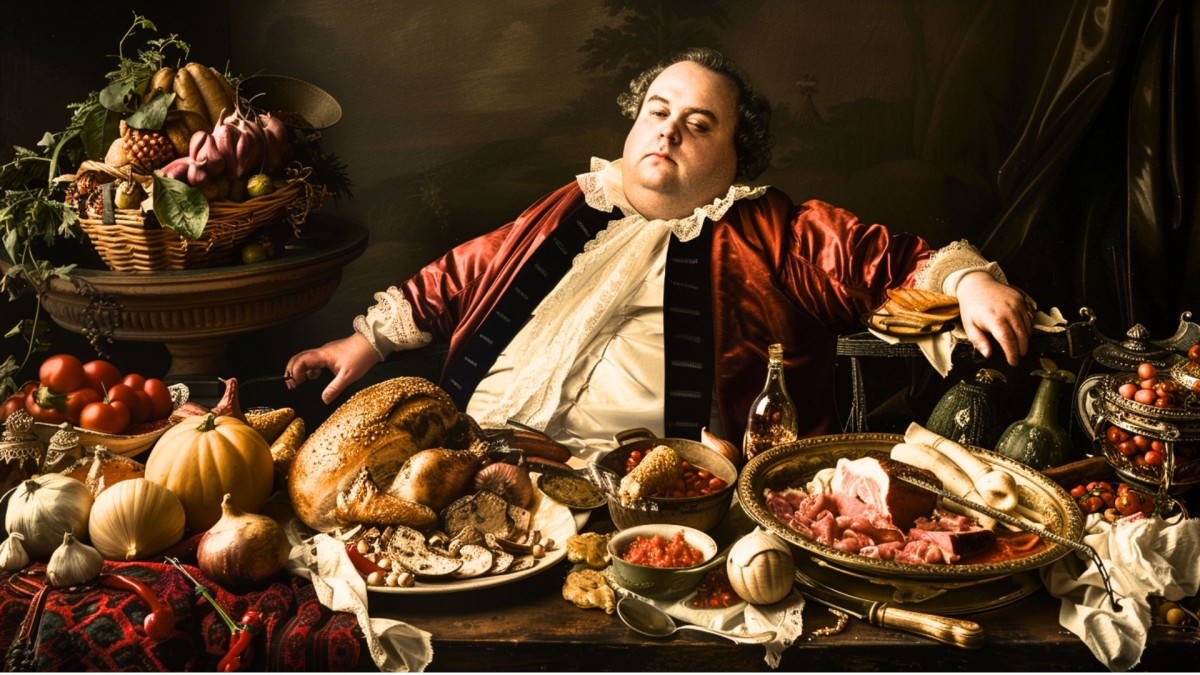 In the 19th and early 20th Century, kings and queens of England would watch their guests from foreign countries eating at banquets, and then copy them. Although foreign dignitaries often had eating habits that were unfamiliar—even disgusting—to the royals, it was not considered polite if royals made their guests feel uncomfortable, even if they found their behavior gross—so they adapted their own eating style to match that of their guests in order to ensure they felt welcome and respected.
In the 19th and early 20th Century, kings and queens of England would watch their guests from foreign countries eating at banquets, and then copy them. Although foreign dignitaries often had eating habits that were unfamiliar—even disgusting—to the royals, it was not considered polite if royals made their guests feel uncomfortable, even if they found their behavior gross—so they adapted their own eating style to match that of their guests in order to ensure they felt welcome and respected.
When I was growing up, my parents told me that I should walk on the outside of the sidewalk when accompanying a female companion, that I should open and close the car door for passengers, that I should wait to eat until everyone was seated and served, and not leave the dining room table until every other person had finished their meal, that it was rude to speak with my mouth full, or to interrupt other people’s conversations and that I should remove my hat when entering a place of worship. Directly repudiating comments or ideas of others was called “contradicting” by my parents and was considered rude and was forbidden.
Recently, White House Communications Director Steven Cheung, made it clear that he did not approve of Michael Wolff’s recent book, “Fire and Fury” when he said, “Michael Wolff is a lying sack of s*** and has been proven to be a fraud. … He routinely fabricates stories originating from his sick and warped imagination, only possible because he has a severe and debilitating case of Trump Derangement Syndrome that has rotted his peanut-sized brain.” Of course he could have said, “I respectfully disagree with Michael Wolff”.
What happened? How did we loose our capacity for empathy, respect and the honoring of others? Cisco says that incivility costs the company twelve million dollars a year. A research project published in the Harvard Business Review found that 97% of employees say they have being disrespected, and half of them say it happens weekly.
Have we lost the art of simple courtesies, respecting others and their choices, working hard to make others feel comfortable, noticed and embraced? Courtesy and politeness foster positive interpersonal relationships; rudeness and snark do the opposite.
The equation is simple: treat others with grace and elegance and they will inspire you; disrespect them and they will hate you.
We can do better than this—as leaders, parents, colleagues, friends, spouses and, above all, human beings. Politeness is enlightened self-interest. My parents also reminded me that one can catch more flies with honey than vinegar! Why is this so difficult to understand?

Thank you, Dr. Secretan, for this perspective and insight.
From my own experience, one of the greatest barriers to civility and politeness today is the dominance of screens in our daily interactions. Visit almost any restaurant, and you’ll see what I mean… Families or couples sitting together, yet each member absorbed in their own phone or device. Children are handed tablets to keep them occupied, while adults scroll or text, often at the expense of meaningful conversation with the people right in front of them.
This shift has replaced the simple courtesies and presence of human interaction with a kind of digital self-pursuit. The bandwidth we seek online too often eclipses the warmth of eye contact, listening, and authentic engagement. My strongly held belief is that selfishness is one of the great terra-threats of our time. I believe it influences the way we relate, narrows our awareness of others, and corrodes the fabric of human connection.
As you remind us, if we don’t remember, reflect, and learn from the lessons of the past, we risk repeating the same mistakes of neglect and division that have plagued earlier generations. In a time marked by polarization and politicization, perhaps the most radical and healing choice we can make is a return to love; expressed through everyday acts of politeness, respect, and genuine attention to each other.
We can, and must, do better.
You are so right david. Our epidemic of narcissism is perhaps another source of this tendency… We are just so self focused that we don’t have time (at least that’s what we think) to focus on the other person and their welfare.
My daughter is a second grade teacher and is finding that children are less and less respectful. Pre-Covid if she dropped something on the floor, 18 kids would dive to pick it up. Now, the kids don’t make a move to assist. And, children are talking over the teacher, don’t understand how to listen, and are basically unaware of how to be polite and considerate of both adults and other children. What has happened to common courtesy?
Great question – is it too much screen time, fear of the way the world is, the aftermath of COVID, or all of these? Or something else?